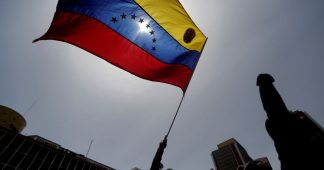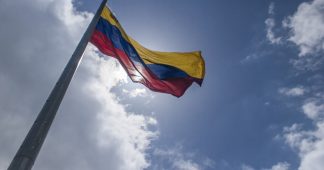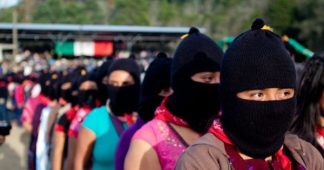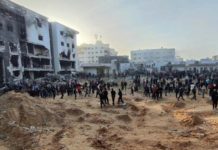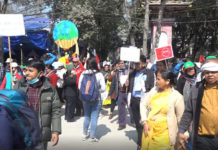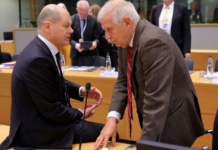FRANCISCO DOMINGUEZ assesses the results of the vote
Dec 15, 2020
VENEZUELA’S free and fair elections to the National Assembly, held on December 6 2020, produced a substantial political victory for Chavismo: out the 277 MPs to be elected, the PSUV-led Great Patriotic Pole (the governing coalition, GPP) won with a 69.43 per cent landslide (4,276,926 votes); the Alianza Democratica (opposition) polled 17.72 per cent (1,095,170); Venezuela Unida received 4.15 per cent (295,450); and smaller coalitions got the remainder of the votes cast.
That is, out of the 277 seats contested, the GPP got 177 with the remaining 97 going to the other coalitions. Altogether, 6,251,080 people voted which represents 31 per cent of the registered electorate. This was the 25th election since Hugo Chavez first became president in 1998.
It was the National Dialogue for Peace, integrated by the Bolivarian government and representatives of opposition parties that came to an agreement, which contemplated, among other things, the designation of a new National Electoral Council.
Additionally, as is the normal protocol, the National Electoral Council (CNE), as part of the consensus between government and opposition parties, introduced a number of changes and conducted some extra guarantees. The specifics were as follows:
The number of parliamentarians to be elected was increased from 167 to 277 out of which 144 (52 per cent) were elected by list, and 133 (48 per cent) by nominal vote; three seats for indigenous peoples also to be elected by nominal voting (held on December 9 2020).
A total of 16 audits to be conducted before, during and after the election, with full participation of all the parties involved, international electoral and computer experts, plus any observer proposed by any of the parties involved, including those invited by the governing coalition and the CNE. There were over 200 international observers coming from 34 countries, and also 1,500 national observers.
A total of 107 political organisations participated: 30 national, 53 regional, 6 indigenous organisations and 18 indigenous regional organisations. Ninety-eight of these fielded candidates against the GPP, only nine of the total supported the GPP. These parties fielded thousands of candidates and, as part of the transparency of the process, the CNE helped to organise 3,500 meetings in the country’s six regions with indigenous population.
There were more than 14,000 polling stations, and over 30,000 electoral tables. International observers could visit any polling station, anywhere, at any time during the election. With the exception of the number of parliamentarians, this election was identical to the election of the National Assembly in 2015 that the opposition won with a landslide.
The international observers from the Council of Electoral Experts of Latin America (CEELA in its Spanish acronym) issued a statement though national television praising the quality, efficiency, transparency and auditability of the election process, pointing out that this was achieved under impressive conditions of bio-safety despite the enormous economic difficulties Venezuela confronts due the US regime of sanctions.
Among the international observers were Evo Morales, Rafael Correa, Fernando Lugo, Jose Luis Zapatero and a number of European MPs, who also vouched for the election’s transparency, with the former president of Spain publicly calling on the EU to recognise the results and stop supporting US President Donald Trump’s sanctions against Venezuela.
All leaders of the participating opposition political parties stressed the importance of voting so as to elect a new National Assembly and condemned the sanctions and military aggression championed by Guaido, the extreme right, and Trump. They did take the chance to criticise government policies, especially in the economic field, but all favoured dialogue.
So, when the EU states that it doesn’t recognise the election results in Venezuela because it |failed to comply with international standards,” what does it mean?
The EU did recognise the 2017 elections in Honduras that not only took place under more or less dictatorial conditions but were dominated by fraud, which was condemned by the Organisation of American States (even Luis Almagro called for fresh elections).
The EU statement on Venezuela was issued on December 7 and has 198 words, whilst on Honduras the EU’s “report” is 43 pages long, and “regrets the deaths of at least 22 people during the post-electoral protests.”
At least the EU did not say it will continue with the farce of recognising the unelected Juan Guaido as president. But don’t hold your breath — the EU’s duplicity on Venezuela has become legendary.
It covered its back on the report on Honduras with the caveat “the contents of this report do not necessarily reflect the official position of the EU.” But it does, doesn’t it? The winner in the fraudulent election was Juan Orlando Hernandez, who in March 2020 was accused by US prosecutors of taking drug money, and a year earlier his brother was found guilty of drug smuggling.
Where is the EU’s ethical indignation about the electoral fraud and the criminal activities?
The electoral council did invite the EU to send an observer mission but, probably frightened and bullied by Trump and co, it informed Venezuela that three months “was not sufficient time” to prepare an observation mission. This from a bloc that in 2019 gave President Nicolas Maduro eight days to organise presidential elections, or else they would recognise Guaido, again a kowtow to the US.
Guaido’s extreme right-wing current did not participate in this election following orders from its US mentors and because it is politically crumbling away.
Mike Pompeo, on behalf of the outgoing Trump administration predictably stated the US will not recognise the election results in Venezuela and “will continue to recognise” Guaido as “interim president.”
Dominic Raab, on behalf of the British government, parroted Pompeo’s stance, including going on with Guaido’s circus, and adding that Britain will continue to recognise him even as president of the National Assembly (whose old mandate ends in January 2020). This may change if the incoming boss, Joe Biden, takes a different view.
Venezuelans went to the polls under conditions of economic war, sanctions, international boycott, intoxicating media war, sabotage, US efforts to militarily blockade the import of food, health inputs and medicine, and an electoral boycott supported by a venomous global media demonisation campaign.
With Trump’s shenanigans about not accepting the US election results, the whole world can see how damaging, destabilising and unsettling such charges can be for any country or any government and how it sows dangerous domestic divisions, courting the most extreme elements (not to mention white supremacists) to take matters into their own hands.
In this regard the Venezuelan people’s resistance is heroic and despite the appeal of adopting strong-arm methods, President Maduro opted for dialogue, peace and democratic elections; this election represents a vindication of this approach.
After the election results were announced, President Maduro again called for a dialogue with the opposition to discuss a joint approach to address issues such as the US blockade, the perverse external attack against the nation’s currency, and the adoption of policies to recover the purchasing power of the population.
People can talk about the size of the election turnout, mention dozens of elections where the turnout was low, and speculate about what would have happened if this or that had taken place until the cows come home.
The fact of the matter is that Trump’s strategy of “regime change,” including the fictional “interim president,” has been defeated and the policy of dialogue and peace has taken another important step on the road to Venezuela’s institutional normalisation, badly dislocated by the aggression of US imperialism and its client Latin American governments (notably that of Ivan Duque in Colombia), and the EU’s complicity.
The road ahead continues to be littered with dangers, but it simultaneously offers fresh opportunities for the nation’s economic recovery so that the revolution strengthens the dynamic of social progress undermined in recent years by external aggression.
Guaido has been terminally wounded with this election, the Lima cartel is decomposing away, and Almagro and the OAS are massively discredited after the coup in Bolivia.
The US proxies that organise and maintain aggression are being neutralised.
Furthermore, the masses have defeated the right in Bolivia and Chile, and Mexico and Argentina now have progressive left governments. And Trump has politically suffered a rather humiliating defeat.
The international solidarity movement must redouble its efforts to support Venezuela’s national sovereignty, seek respect for the Venezuelan people’s vote in electing the 2020-25 National Assembly, and campaign for the British government, the European Union, European governments and the United States to develop a normal, constructive engagement approach with Venezuela.
* Francisco Dominguez is secretary of the Venezuela Solidarity Campaign.
Published at morningstaronline.co.uk
